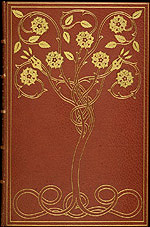A recent conversation on the Book Arts List led to an exploration of some women binders in the late 18th and early 20th Century. A request from Karen Hanmer for information about book arts in Halifax led to Barbara Kretzmann's post about the Prat sisters of Nova Scotia who ran the Primrose Bindery in NYC. Susan Mills connected us to the virtual archives of Nova Scotia which has a section on the Prat sisters. Here is part of the introduction:
Annie, Minnie and May Prat, adventurous sisters from Wolfville, Nova Scotia, embarked on unusual artistic careers in the United States in the late 1890s. In 1896, Annie, 35, enrolled at the School of the Art Institute of Chicago. In 1897, Minnie, 29, moved to New York City to learn bookbinding with Evelyn Nordhoff, who had herself apprenticed in England with noted Arts and Crafts bookbinder, T.J. Cobden-Sanderson. May Rosina, 26, joined Minnie shortly afterward to study decorative leatherwork and bookbinding with Nordhoff.
The sisters had a fascinating circle of friends, centered around the Prat family home in Wolfville. Chief among them were poets Charles G.D. Roberts and his cousin, Bliss Carman, and Charles G.D.'s younger brother, Goodridge, who was engaged to Minnie. In 1892 tragedy struck the Prat family circle. On February 4, a month before Minnie's 24th birthday, Goodridge, 22, died of influenza at the Prat family home. Her father, Samuel, died of the same illness nine days later.
Five years later, Minnie found the courage to go to New York to apprentice with Nordhoff, in a field in which women were still pioneers. Bliss Carman, then living in New York, had arranged for the apprenticeship. Evelyn Nordhoff died unexpectedly in November 1898, at the age of 33, after a short illness. Minnie, May Rosina, and other former students kept her bindery going after her death.
In addition to an illustrated essay, there are images of their artwork, bindings, letters, and this wonderful photograph of May Rosina Prat and Dorothy Cornell operating the book press at Dorothy's book bindery at 'Forest Park' in Ithaca, New York.
I was so fascinated by the three sisters that I did a little more research on women binders in that era and came across a New York Times article Hand Bookbinding Among Women by Minnie J. Reynolds which was published on March 9, 1902. She concludes by saying:
Hand binding is …a part of that wide, recent movement against the machine which demands opportunity for artistic expression in the crafts as well as the high arts.
From the Princeton University Library, Unseen Hands: Women Printers, Binders, and Book Designers.
From Oak Knoll Press—the book Women Bookbinders, 1880-1920 by Marianne Tidcombe about women binders in Britain.
And then there is this fascinating study of unions among women binders published in 1913 by the Russell Sage Foundation.
The bookbinding trade was chosen first for
study because it is one of the most important
trades for women in New York City, and also in
many respects a typical one. As Miss Van Kleeck
explains, it affords employment to every grade
of woman worker from the skilled craftsman who
does artistic binding by hand to the machine
operator, the hand folder, the wrapper, and the
errand girl. The competition in it between out-
going hand processes and incoming machine proc-
esses is incessant. In some branches work is
regular; in others it is highly irregular, overtime
and free days occurring in the same week. Finally,
there is a union in the trade to which some of the
women employes belong; while most of the women
are unorganized and little impressed by the ad-
vantages of organization. Bookbinding in New
York City thus presents in miniature most of the
important problems which confront women wage-
earners.




this is so cool, who knew? not me! thanks Susan. I'm going on a hunt now for some of the works you mentioned. I love book binding.
ReplyDeleteWhat a wonderful post, Susan. This topic would make a great artist book!
ReplyDeletedot